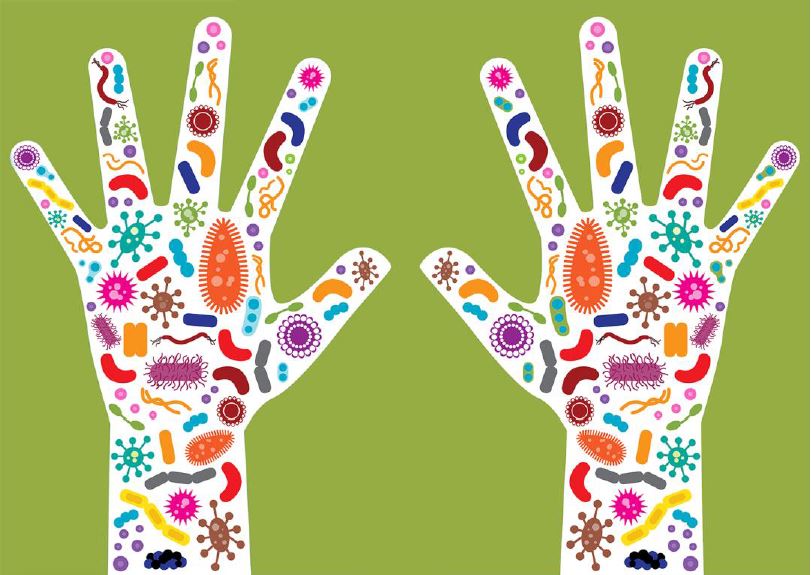The Gut Microbiome Revolution
One of the most interesting and rapidly developing areas of medical research today may well be on the bacteria that live in your gut. In fact, the focus on the gut (leaky gut) has been one of the main premises of the "functional" and "integrative" medicine movement among physicians in the U.S. The importance of this area of research is highlighted by the NIH's creation of the Human Microbiome Project (HMP) Roadmap Project designed to enable comprehensive characterization of the human microbiome and to analyze its role in human health and disease. Current studies indicate that the gut microbiome may affect your susceptibility to many diseases, how much you weigh, and how long you live. It is becoming more and more evident that "what you eat" influences your gut microbiome.
Living inside of your gut are up to 1000 different kinds of bacteria containing nearly 2 million genes. Paired with other tiny organisms like viruses and fungi, they make what’s known as the microbiota, or the microbiome. The bacterial cells within our gastrointestinal tract outnumber the body's cells by a factor of 10, and the genes encoded by these bacteria outnumber our other genes by more than 150 times. Imbalance of the normal gut microbiome has been linked with gastrointestinal conditions such as inflammatory bowel disease (IBD) and irritable bowel syndrome (IBS), and wider systemic manifestations of disease such as obesity, type 2 diabetes, depression (and other mental illnesses), allergies and autoimmune diseases.
Like a fingerprint, each person's microbiota is unique, with the mix of bacteria in your body different from everyone else's mix. The composition of your gut microbiome, however, appears to be mostly influenced by the environment rather than your genes. In a recent large study published in Nature, researchers analyzed genes of colon bacteria from 1,046 healthy people and found that the bacterial composition of the colon is determined primarily by lifestyle and what you eat, and has less than a two percent association with one's genes.
The researches also found that genetically unrelated people living in the same household tended to have similar bacteria in their colons, while a person's relatives who did not live in the same household had totally different colon bacteria. This is an incredibly exciting study because a motivated person can change his lifestyle but at this time scientists have no safe way to change a person's genes.
Anti-Inflammatory Diet and Bacterial Endotoxins
Another recent study shows how an Anti-Inflammatory diet helps to prevent diseases and prolong life by changing the colon bacteria and reducing the harmful endotoxins produced when your body turns food into energy (Advances in Nutrition, May 15, 2018;9(3):193–206). Hundreds of studies show that an overactive immunity (inflammation) is a major cause of disease and premature death in North America today. Several recent studies suggest that certain bacteria in your colon can cause a two- to three-fold increase in blood levels of bacterial endotoxin that can cause inflammation - the "leaky gut" or "intestinal permeability,".
Leaky gut is a condition in which the lining of the small intestine becomes damaged, causing undigested food particles, toxic waste products and bacteria to "leak" through the intestines and flood the bloodstream. The foreign substances entering the blood can cause an autoimmune response in the body including inflammatory and allergic reactions such as migraines, irritable bowel, eczema, chronic fatigue, food allergies, rheumatoid arthritis and more. Diets that are high in saturated fat and low in fiber, which is a typical Western diet, contribute to metabolic endotoxemia and leaky gut through several mechanisms, including changes in the GI microbiome and bacterial fermentation end products, intestinal physiology and barrier function, and enterohepatic circulation of bile acids.
Thus, an Anti-Inflammatory diet pattern, low in saturated fats, low in sugar and high in fiber, is one dietary strategy to improve your health by reducing metabolic endotoxemia and inflammation.
Healthful and Harmful Colon Bacteria
Two to six pounds of bacteria, or about 40 trillion bacterial cells, live in your body. Of the different types of bacteria that live in your colon, some are good for you while others can be harmful. The healthful bacteria are content to eat what you eat as food passes through your intestines, so they stay in your colon and do not try to cross into your cells and bloodstream. Healthful colon bacteria can form metabolites that help to prevent obesity, diabetes, and heart attacks. On the other hand, the harmful bacteria produce damage to the lining of your intestine, allowing endotoxins and other chemicals into your blood. The damage caused by invading colon bacteria turns on your immunity leading to disease causing inflammation (PLoS One, Apr 13, 2017:12(4):e0176062).
Gut Microbiome and Your Weight
Multiple studies now show that obesity is associated with unhealthful colon bacteria (Postgrad Med J, May 2016;92(1087):286-300). Interestingly a study in twins, in which one is obese and the other is lean, showed that transferring the colon bacteria from the obese twin to mice made mice obese, while transferring the bacteria from the lean twin did not fatten the mice (Science, 2013 Sep 6; 341(6150):10.1126). Overweight people may have colon bacteria that make chemicals that send different signals to the body and brain, which promote increase eating and fat storage.
How to Grow a Healthful Microbiome
Eat lots of fruits, vegetables, whole grains, beans, nuts and other seeds. They are high in fiber that foster healthful colon bacteria
Eat fish and limit mammal meat
Limit refined and high glycemic load carbohydrates
Avoid fried foods
Avoid artificial sweeteners. Some artificial sweeteners appear to stimulate the growth of unhealthful colon bacteria
Avoid nonsteroidal anti-inflammatory drugs (NSAIDS)

